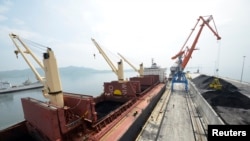While the U.S. Congress is pushing ahead on legislation that seeks to increase sanctions on North Korea for its purported nuclear test last week, experts say strong economic sanctions are key to the effort.
Despite widespread international condemnation against the latest test, persuading Pyongyang to abandon its nuclear ambition appears to be a difficult task. Experts appear to agree Pyongyang is making steady progress on its nuclear weapons program, although Washington and Seoul were not convinced by Pyongyang’s claim to have successfully tested a hydrogen bomb.
William Perry, former U.S. Secretary of Defense, warned of Pyongyang’s effort to miniaturize nuclear weapons.
“The object of the test in my judgment is a test to make nuclear weapons they have smaller and more compact so that they can fit on the warhead of the missile,” the former defense chief told an audience at a forum in Washington this week.
Growing nuclear threat
Pyongyang is under heavy international sanctions for its development of nuclear weapons. The United Nations Security Council has imposed four sanctions aimed at deterring Pyongyang from developing and possessing weapons of mass destruction, such as nuclear weapons, since the communist country’s first nuclear test in 2006. But many experts say the sanctions have not produced intended results because of lax enforcement of the sanctions.
David Asher, who led the U.S. effort to crack down on North Korea’s illicit activities during the former Bush administration, said Washington needs to increase financial pressure on Pyongyang.
“I think the need for a much more extreme financial containment and a pressure strategy against North Korea is greater now than ever,” said Asher.
The former official called for an intensive international effort involving multiple domestic and foreign agencies to target financial dealings between foreign entities and North Korea that could help Pyongyang’s nuclear development.
“We are going to have to aim to target foreign financial institutions and foreign trading companies, which are fronting for North Korea, many which exist in China today,” said Asher.
Financial pressure needed
William Newcomb, a former U.S. Treasury official who also worked as a panel member of the U.N. Security Council committee monitoring sanctions on North Korea, said Washington could try the previous effort targeting foreign entities that deal with Pyongyang, in reference to the U.S. Treasury’s sanctions against Banco Delta Asia (BDA), a Macau-based bank.
In September 2005, the U.S. agency designated the bank as a “primary money laundering concern” for its alleged assistance to North Korea’s illicit activities such as money laundering and counterfeiting. The designation led to a freezing of some 50 North Korean accounts in Macau worth $24 million and limited Pyongyang’s access to foreign financial institutions.
Newcomb said a similar action could be still effective, adding detecting North Korea’s illicit activities is more difficult now as Pyongyang has adopted different practices since the crackdown.
Beijing’s participation
In an op-ed piece for The New York Times last week, Robert Gallucci, who led the U.S. delegation that negotiated a nuclear deal with North Korea in 1994, and Victor Cha, a professor at Georgetown University who participated in the nuclear talks with the North during the former Bush administration, argued that Washington should push for Beijing to scale back its economic support for Pyongyang.
“China could instruct Chinese companies to curtail business with North Korea, and the government could reject any calls from North Korea for new economic projects until the government returned to negotiations,” they wrote.
They urged the United States and the United Nations to immediately increase sanctions.
Yun Sun, a senior associate with the Stimson Center in Washington, said Beijing is likely to join the U.N. effort to impose fresh sanctions on Pyongyang, but the participation would not necessarily mean Beijing’s willingness to discontinue its support for Pyongyang. Yun, who stayed in Beijing when Pyongyang conducted the test, said the move is not likely to change Beijing’s policy toward Pyongyang.
“I think the Chinese will be onboard for more international sanctions, but I don’t think the Chinese will come onboard to really touch the fundamental support that China is providing to Pyongyang,” said Yun.
On Wednesday, Washington vowed commitment to “continued vigorous enforcement” of its existing sanctions against Pyongyang in response to a new bill that tightens sanctions on North Korea. The measure passed by the U.S. House Tuesday would call for the president to sanction individuals and entities engaging in transactions with Pyongyang related to weapons of mass destruction, luxury goods, and illicit activities. The Senate is also considering a similar bill.
Baik Sungwon contributed to this report.











